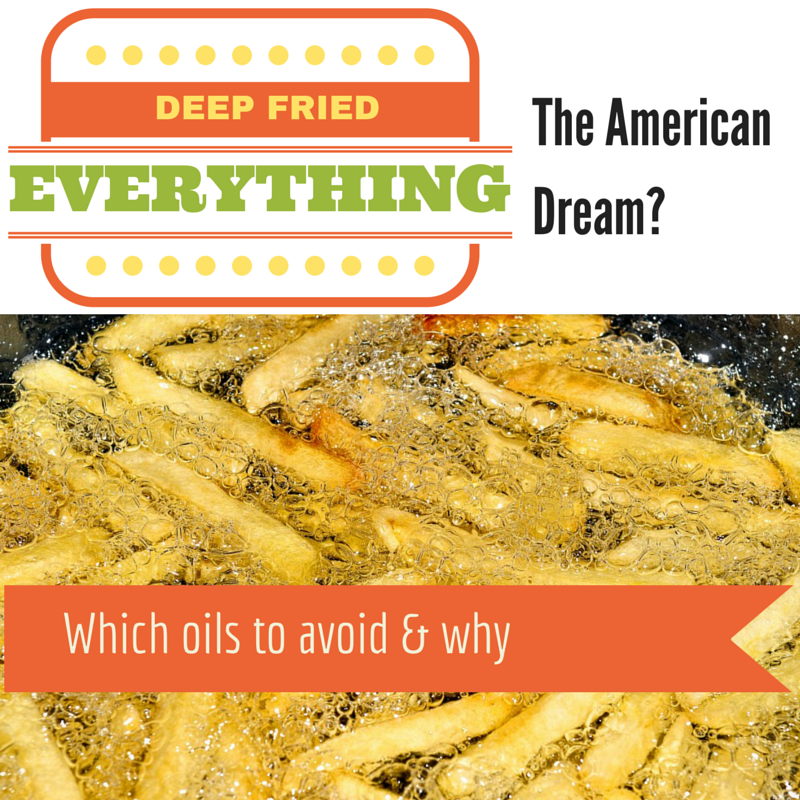
The idea that fried foods are bad is old news.
Why? Most people will say “Uh, high fat, duh!” Well, is it really that simple? Has the recent debate on whether or not fats, sugars, meats, processed foods, or even all of the above are good or bad made you think…”Why?”
I guess thinking we can begin living off of air and sunlight will become popular soon.
I’m not here to bash anyone, but I am here to analyze the facts and find out where people are right about these things. With the right answers, it can help us build a foundation for confident and intelligent action.
The problem here is not just with any old fat, it’s with the type of fat.
Let me tell you a little story.
A long time ago, before 1983, McDonald’s fried their food in beef tallow. Then, a few decades ago they, along with pretty much every other restaurant in the world, switched to using vegetable oil instead. They switched to the unsaturated oils to be “heart healthy”—oh, and also cheap.
See, before it was considered bad for your heart to consume animal fats due to their high saturated fat content, it was considered bad to eat…you know, industrial products such as paint mediums and wood varnish, like these new “heart healthy” oils.
Today, these highly industrial seed oils, which are rich in polyunsaturated fats, are what’s for dinner, but it appears that a tremendous wrong turn was had. Recent research is uncovering what seems like kind of a pretty obvious thing to begin with: that the oils, which do such a good job of drying in a plastic-like mass and can seal wood, aren’t very good for your arteries.
Presently, a scientist, who is nearly 100 years old, is showing fairly conclusive evidence that the signs of heart disease are all promoted and likely caused in many situations by the consumption of the highly unsaturated type of fats.(1)
Here’s the quick science version:
The reason why these fats dry on wood is due to the fact that an unsaturated fat can absorb oxygen. This oxidized state becomes a polymer similar to plastic and so it becomes sticky and strongly bound together. This unsaturated fat also is easily incorporated into the tissues of the body as a phospholipid. It has been shown that these fats can damage the other proteins and fats in the body, including the artery walls and especially the lipoprotiens such as LDL, which carry cholesterol in the blood. So oxidized cholesterol or oxidized LDL particles (which are a big buzz word in the heart disease world right now) are very effectively produced by these polyunsaturated fats and the trans fats produced from them.
It is also the case that these phospholipids produced from the fats increase the intake and accumulation of calcium.
Calcified arteries…hardened arteries…. If it’s not ringing a bell, it’s how the whole heart disease equation begins even before the fatty streaks begin to accumulate on the inside of the arteries.
Now to continue the heart disease equation from there:
Once a bunch of oxidized particles form within the tissues of the cardiovascular system and the blood, we have a problem of their related “stickiness.”
Yep, it’s all really beginning to come together now, isn’t it? Pardon the pun.
These oxidized fats then increase other processes too complicated to go into here. The important bit is that they create blood clotting, which is the final number in the whole heart disease equation.
Sticky particles building plaque, narrowing the passage…and now here comes a blood clot.
So unfortunately it looks like McDonald’s actually had it right the first time with the beef tallow.
There are still some restaurants out there savvy to the whole deal, but they will mostly say they use saturated fats only for cooking with the occasional olive oil. People are starting to get it, though. The higher hurdle is getting science to help pin this one down for the medical industry.
But I mean, wood sealer? Really? We couldn’t have just figured that was a bad idea from the beginning?
Here are the fryer oils to avoid:
- Canola (& rapeseed and safflower oils are essentially the same thing)
- Corn
- Soy
- Vegetable
- Flax (linseed)
- Cottonseed
- Sunflower
- Peanut (sure tastes great though…)
- Rice bran (I mean how much bran does it take to get the oil out??)
The list goes on, but these oils are the most common. Basically, if it isn’t beef, lamb, coconut, palm, butter, or clarified butter, don’t eat it.
Want to get deeper? Check out my Foundation for Human Nutrition post here on the blog.
Reference:
(1) Study outlining all of the above relationships between fryer grease and heart disease by Fred A Kummerow – http://www.ncbi.nlm.nih.gov/pmc/articles/PMC3584645/








1 Comment